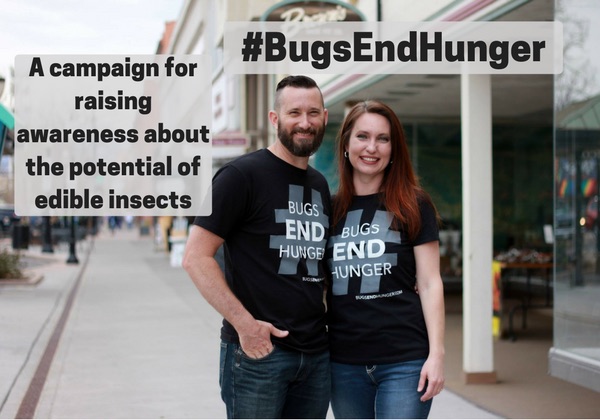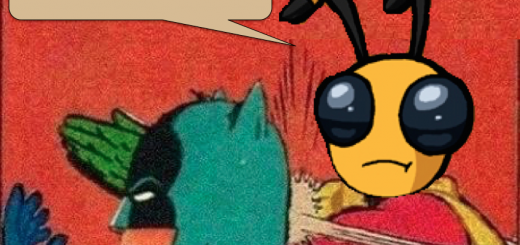A campaign for promoting edible insects : Bugs End Hunger
Today’s article means a lot to me… We often speak about how eating insects could be a solution for malnutrition and one team is making more than speaking louder and is paving the path: Seeds of Action.
The co-founder Jeremy and the whole team believe that “Changes start with education” and they will take action for raising awareness.

We are taking action to demonstrate that consuming insects is a great way to end global hunger. Jeremy Connor, Co-Founder of Seeds of Action, will be conducting a month long experiment starting May 1st 2017. With medical oversight, his diet will consist only of insects and the plant based foods that can either be found locally or brought in through food aid programs in the 4 regions with the highest concentration of the 1 BILLION chronically hungry.
He will work with several companies in the entomophagy industry. As participating with Livin farms, I’m proud to be part of this adventure #BugsEndsHunger
Secondly, as someone who doesn’t eat meat but insect, I’m really enthusiastic about this idea.
Jeremy is full of energy and passion, associated with Little Herds, it’s gonna be an amazing journey! They will also create an open FIG (Farming insect guide)
Thunderclap for eating insects!
For supporting them; click on this thunderclap link, choose your account and a message will be programmed. On the 1st of May, all messages will be published at the same time! A real thunderclap for entomophagy!
How can eating insects be a solution to end malnutrition?
First of all, let’s be clear, they are not a « famine food ». It is true that in some countries suffering from malnutrition and famine, people eat insects but it is everywhere a deliberated choice and high-valued food. For example, in Nigeria, grasshoppers are more expensive than beef, so what is the food more affordable for the poor?
- Insects are really high in proteins:
- Edible Insects contain “good” fats:
- Insects are high in vitamins and minerals:
Proteins are an essential nutrient for our body. Insects proteins are a complete source of proteins, containing all 9 essential amino acids and high in semi-essential amino acids. Essential amino acids can’t be produced by our body and need to brought by food. Semi-essential amino acids can’t be produced in sufficient amount by certain people and at a certain period of our lives.
Fats are the densest macronutrients. Essential fatty acids such as Omega-3 are essentials for our brain development. Some species of insects, such as crickets, contain a certain amount of fats and especially the essentials fatty acids.
Another case of malnutrition is the hidden hunger1. People suffering from hidden hunger have enough calories but lack certain micronutrients such as vitamins and minerals. This can occur if either you don’t consume enough of them or you body don’t absorb them properly. That’s a good news for promoting entomophagy! Crickets, grasshoppers, and mealworms are really high in iron and zinc with an excellent bio-availability.2
Why is farming insects a solution for ending hunger?
- It is sustainable and requires few resources:
- It can be easy, require low investments and can be done locally:
Farming edible insects require few space, few water and moreover they can be fed on by-products and food waste. As an example, black soldier fly and crickets can be fed on market waste.
Insects can be easily farmed in different places.
More than providing food, it is also a skill and a job that people learn. By farming insects, they can provide a source of food and income to their families.
Instead of shipping food which can disrupt the local economy and not cover all the nutritional needs, we can empower people to become microlivestock farmers and support the local economy.
Give a man some food, and you feed him for a day. Teach a man to farm insects, and you feed him for a lifetime
For sure, this campaign is only the beginning, but I’m sure it’s the beginning of something great. Farming insects will bring new and unexpected obstacles, but that’s how it is when we want to find solutions! With the attention brought by this campaign, I’m confident!
If you weren’t convinced the first time before reading the article, I’m sure that now you are! Here is your last chance to support Seeds of Action!
Resources :
1Wageningen University lesson: NUTR102x Nutrition and Health Part 2: Micronutrients and Malnutrition
2Gladys O. Latunde-Dada – In Vitro Iron Availability from Insects and Sirloin Beef J. Agric. Food Chem., 2016, 64 (44), pp 8420–8424 DOI: 10.1021/acs.jafc.6b03286




Wonderful article! We really need to bring more awareness to eating bugs and how it can help save the planet.
Thank you!
Hi!
Thank you so much for those kind words! I really really appreciate!